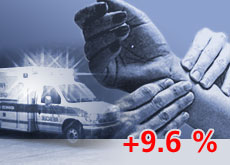
Health reforms get short shrift

Swiss voters have turned down a proposal to link health insurance premiums to income and wealth.
The initiative, backed by the Social Democrats, would have brought the Swiss system into line with the rest of Europe.
Nearly three-quarters of voters rejected the initiative, which would have pushed up considerably premiums for the wealthy.
Social Democrat parliamentarian Franco Cavalli – who supported the initiative – said the current system was flawed because middle-income families are paying too much.
“At the moment everyone pays the same for basic insurance,” he told swissinfo.
“The very wealthy pay much less than they would in France, Germany or the Netherlands, and the less well-off end up paying much more than they would in the rest of Europe.
“This is imposing an incredible financial burden at the moment, mainly on families with an average income.” He said the Swiss system ensures access to healthcare for everyone.
“Basic cover and high standards are the principles of a fair health system,” he told swissinfo. “Switzerland has both of those.”
A fair system
Although Couchepin admitted there is room for improvement in the current system – along with a need to reduce health costs – he insists the proposals would not have helped.
“It would not reduce costs and would lead to a huge increase in Value Added Tax.”
Switzerland is the only European country in which premiums are not linked to personal income.
Individuals of the same age and sex, living in the same canton, pay an identical price for the same healthcare coverage, regardless of income.
The initiative calls for around 75 per cent of basic health insurance costs to be linked directly to income and personal wealth.
The remaining 25 per cent would be financed by a 1.5 per cent increase in the rate of VAT.
Central planning
The proposals also called for many aspects of Swiss health policy to be administered at a federal rather than cantonal level.
At the moment, although health policy is formulated at a federal level, the cantons are individually responsible for implementation.
“There is no clear definition of who has responsibility for what,” said Cavalli. “Each of the 26 cantons can do basically what they want.
“Technological and demographic changes are happening all the time and because we need to be able to respond rapidly to a changing world, more coordination needs to be done at a federal level.”
Cavalli rejected government criticism that the initiative was merely a move towards a centralised health policy.
He insists that allowing “high-tech” medicine, for example, to be coordinated at a federal level would help reduce overall costs.
“All experts agree that two heart transplant centres would be enough for Switzerland,” he said. “But under the current system we have seven.”
Spiralling costs
Health care costs in Switzerland are among the highest in the world, accounting for 10.4 per cent of the country’s Gross Domestic Product, according to 1998 figures from the Organisation for Economic Cooperation and Development.
Since taking over at the interior ministry in January, Couchepin has been looking at a number of ways of reducing the country’s spiralling healthcare costs.
These include raising the minimum excess an individual has to pay for all medical bills.
At the moment patients are expected to pay the first SFr230 of any medical bill. Couchepin wants to increase that amount to SFr300.
But he admits that such a move would not be a panacea for cutting costs and would have to be backed up by a full package of reforms.
Cheaper drugs
Parliament is currently discussing a number of other proposals including limiting the number of doctors and easing imports on cheaper drugs.
But Cavalli maintains that the only way of reduce overall costs and creating a “fair” health system is to “introduce tax-like financing”.
“The other measures being put forward at the moment are ones which will lead to different kinds of medicine: one for the rich and one for the poor.”
swissinfo, Jonathan Summerton
Nearly three-quarters of voters threw out the initiative.
Supporters wanted 75 per cent of basic health insurance costs to be linked directly to income and personal wealth.
The remaining 25 per cent would have been financed by a 1.5 per cent increase in the rate of VAT.
Basic health insurance has risen by almost 30 per cent in Switzerland since 1996.
Switzerland is the only European country in which premiums are not based on the level of personal income.
Health care costs in Switzerland are among the highest in the world – they account for 10.4 per cent of the country’s GDP.
The Swiss health care system relies on individual contributions and taxes collected at both a federal and cantonal level.

In compliance with the JTI standards
More: SWI swissinfo.ch certified by the Journalism Trust Initiative



































You can find an overview of ongoing debates with our journalists here . Please join us!
If you want to start a conversation about a topic raised in this article or want to report factual errors, email us at english@swissinfo.ch.